|
Pivotal Pro Football Moments
pivotal NFL postseason moment: A decision by a coach or an action by a player that establishes, continues or changes the momentum of a playoff game.
Doomsday Defense Stifles 49ers
1971 NFC Championship: San Francisco 49ers @ Dallas Cowboys
Dick Nolan had a nine-year NFL career as a defensive back for the Giants, Cardinals, and Cowboys. He played only a half-season for Tom Landry's Cowboys in 1962 before becoming Landry's defensive coordinator through 1967. That performance got him a head coaching job from the San Francisco 49ers in 1968.
Nolan's Niners made the NFC playoffs in 1970 with a 10-3-1 record, good enough to win the NFC West. But after beating the Vikings in the first round of the playoffs, the 49ers lost to the Cowboys at home 17-10.
The next year, the 49ers again met the Cowboys in the playoffs. Dallas beat the Vikings 20-12 and San Francisco upended the Redskins 24-20 to reach the NFL title game.
Landry and Nolan remained close friends and confidants, but that was put on hold the week the teams met. Landry called on Monday to congratulate Nolan on beating the Redskins and said they'd talk again Sunday, after one of them was headed to the Super Bowl.
Nolan said, "I guess it's going to be a matter of being good friends for a long time but hating each other temporarily this week. Let's face it. He taught me everything I know."
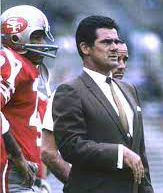  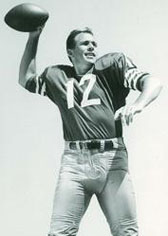 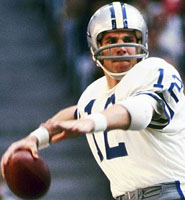 L-R: Dick Nolan, Tom Landry, John Brodie, Roger Staubach The 49er coach had the advantage of knowing the Dallas defense as well as anyone. Only Herb Adderley, Cliff Harris, and Larry Cole had joined the starting lineup since Nolan was the Cowboys defensive coordinator.
After losing to Dallas in the 1970 NFC Championship Game, Nolan promised, "We'll be back." And here they were in the conference final again. Nolan had spent the entire offseason analyzing the last game of the '70 season. His conclusion: Dallas won because they had more experience.
Landry had inklings about what new wrinkles Nolan might implement and began plotting counter strategies. "I'll make him think I'm going to change a whole lot," Landry said. "What I'll change, I won't say, but I'll change more because of their knowledge of our defense."
Reporters listed Dallas's biggest problem as stopping the 49er passing game led by 15-year-veteran QB John Brodie. By contrast, San Francisco's challenge would be slowing down the Cowboy running game, something they couldn't do in the previous year's championship clash when Dallas ran for 229y to Frisco's 61.
Andrie's Interception Sets Up First Score
Neither team threatened in the first quarter.
The Cowboys got the first break early in the second period. Dallas P Ron Widby punted to the 49er 27, and a clipping penalty backtracked the ball to the 12. The big electronic scoreboard in Texas Stadium flashed a prophetic message: DOOMSDAY! The word referred to the Dallas defense.
Brodie called a screen pass for his first play. He faded back, looked to the right to misdirect the defense, then threw the ball toward RB Ken Willard on his left. But 6'6" DE George Andrie diagnosed the play, spun off his blocker, caught the ball at the eight as if he were the intended receiver, and rumbled to the one.
Willard thought for sure the play would gain yardage when LB Chuck Howley fell down. "It never occured to me he'd (Andrie) pop up. ... I figured everything was okay. Some surprise!"
Andrie said, "It was just an impulsive play. We had studied San Francisco's screen plays. We were blitzing, and I just saw the screen coming. I stepped over, and Brodie threw the ball right to me. I don't think he saw me."
On second down, QB Roger Staubach handed to RB Calvin Hill who leaped over the goal line. 7-0 Dallas with 11:29 remaining in the first half.
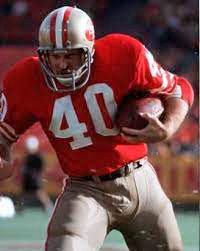 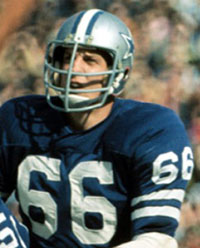 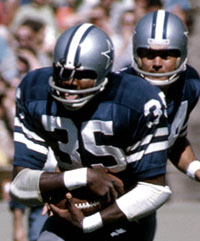 L-R: Ken Willard, George Andrie, Calvin Hill Hill had been troubled by a bad knee, and landing his 235lb on it in the end zone aggravated the problem. As he returned to the bench, he told RB Duane Thomas, "I think my knee is going again."
Calvin continued in the game but on his ninth carry, he turned the corner on a sweep. When he cut to the left, he went down untouched. "It felt like the ligament gave way," he explained.
The Doomsday Defense held the 49ers to a single first down in the first half. But the Cowboys could not lengthen their lead.
49ers Get on the Board
Nolan's staff made adjustments at halftime that led to third quarter points. Brodie connected with WR Gene Washington for 24y to give the 49ers their best field position so far. Two series later, they got close enough for Bruce Gossett to kick a 28y field goal.
Cowboys 7 49ers 3 Later in the quarter, Gossett got another chance but missed. The Cowboys then embarked on a 14-play 80y march that salted the game away.
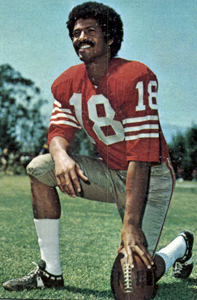   L-R: Gene Washington, Bruce Gossett, Walt Garrison Staubach and Garrison Lead March to Clinching Touchdown
RB Walt Garrison had been a forgotten man for two years after Duane Thomas became Hill's sidekick in the backfield. Now he replaced the injured Hill in the first half and ripped off key runs to keep the chains moving. The longest gain came on Staubach's 22y pass to TE Billy Truax. The touchdown came on a pitchout to RB Duane Thomas who gained the final 2y around left end.
The 49ers ended the game with only nine first downs as Brodie completed only 14 of 30 passes for 184y. Staubach's statistics were mediocre also: 9 of 18 for 103y. However, Roger the Dodger scrambled for 55y to help the Cowboys control the ball. They ran 55 plays to just 30 for San Francisco.
Both coaches pointed to Staubach's scrambling as a key factor in the Dallas win. Landry: "We are backed up a couple of times in the second half, and Roger scrambled around and hit third-down passes to Truax and (Dan) Reeves. If we had to punt in those situations, we would have been in trouble both times."
Landry also cited the contribution of Garrison, who gained 52y on 14 carries. "We didn't move the ball at all until Garrison came in there and picked us up. He started us rolling offensively in the second half."
References: Breakthrough 'Boys: The Story of the 1971 Super Bowl Champion Dallas Cowboys, Jaime Aron (2011) |